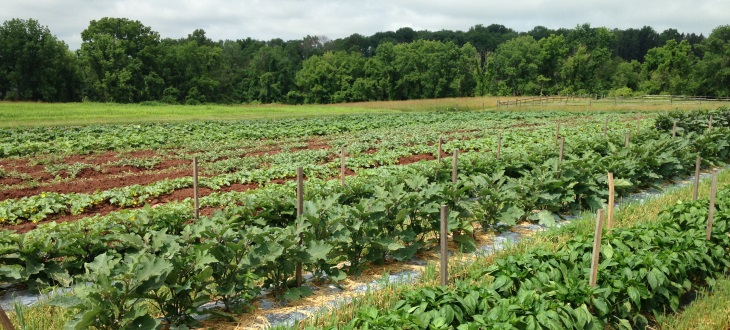The State We're In
Organic conference highlights benefits of healthy soils
How often do you think about the soil under your feet? Not much, probably!
But the folks at the Northeast Organic Farming Association of New Jersey are serious about it. To them, soil is not just dirt … it’s a living thing that’s crucial to producing healthy foods, and a powerful ally in the fight against climate change.
According to Mike Rassweiler, president of the Northeast Organic Farming Association (NOFA-NJ for short), healthy soils are full of living organisms, including fungi, bacteria and algae. Healthy soils produce nutritious foods and absorb and store carbon from the air.
“NOFA’s priority is to build a healthy, living soil,” he said. “Organic management practices are designed to reduce reliance on spraying herbicides, pesticides and fungicides on soil. People have no idea how much we’re losing when we do that.”
Soils are complex. They are composed of organic matter, minerals from rock, water, air and organisms. A single inch of topsoil can take 500 years or more to form!
Protecting and restoring soil is the topic of NOFA-NJ’s 30th annual Winter Conference, on Saturday, February 1, at the Rutgers Douglass Student Center in New Brunswick.
For both farmers and home gardeners, the Winter Conference has 32 workshops ranging from growing organic hemp to selling produce at urban farmers markets, from fermenting your own fertilizer to making botanical remedies from weeds and wild plants. “There are four time slots, with eight workshops going on in every time slot,” said Rassweiler.
Several workshops address “regenerative” organic agriculture, which uses farming techniques to restore and improve soils.
Joseph Heckman, professor of soil science at Rutgers University, will talk about soil health; and Jen Salinetti, the co-owner of a farm in Massachusetts that uses regenerative, no-till farming practices, will address the essentials of no-till preparations for planting.
Rassweiler said plants grown with regenerative agriculture may be better at sequestering carbon in soil than those grown using conventional agriculture. “There’s a lot of evidence that the carbon concentrations are much higher in soil farmed using organic practices,” he noted.
According to the Rodale Institute, if conventional agricultural practices around the world were replaced with organic regenerative techniques, cultivated lands could offset over 40 percent of global carbon emissions, and pasture lands could offset 71 percent!
Regenerative techniques mean little or no tilling of the soil, planting a diversity of crops, rotating crops, planting cover crops to avoid bare soils, and avoiding fertilizers and other chemicals that disrupt the relationship between soil microorganisms and plant roots.
Speakers at the Winter Conference include Bob Quinn and Liz Carlisle, co-authors of the Grain by Grain, which describes Quinn’s quest to grow an ancient variety of wheat on his organic farm in Montana. Quinn discovered that time-tested practices like cover cropping and crop rotation produced successful yields without pesticides.
If you’d like to grow healthier foods, help with soil health and fight climate change, go to the Winter Conference! To register and see a full schedule of workshops, go to https://nofanj.org/winter-conference/. And be sure to check out the rest of the NOFA-NJ website for other public programs all year round.
And to learn more about preserving New Jersey’s land and natural resources – including farmland – visit the New Jersey Conservation Foundation website at www.njconservation.org or contact me at info@njconservation.org.
About the Authors
Alison Mitchell
Co-Executive Director
John S. Watson, Jr.
Co-Executive Director
Tom Gilbert
Co-Executive Director, 2022-2023
Michele S. Byers
Executive Director, 1999-2021
View their full bios here.
Filter
Get The Latest News
From The Garden State
In the
News

